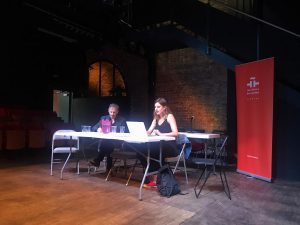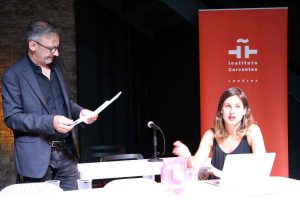CONVERSACIONES HISPANO-BRITÁNICAS – Jorge de Juan: “El Cervantes Theatre quiere ser parte de este nuevo renacimiento que ha de llegar”

Esta semana comenzamos una serie de entrevistas a personajes del ámbito hispano-británico. Nuestro primer invitado es Jorge de Juan, fundador y director artístico del Cervantes Theatre, quien nos contará los inicios del teatro, cómo repercute la crisis del COVID-19 en su trabajo y sus planes de futuro.
Jorge de Juan (Cartagena, 1961), actor, productor y director de cine y teatro español, se formó en la Real Escuela de Arte Dramático de Madrid y en la Asociación Británica de Teatro. Ha dirigido obras como The Public and The Grain Store (Fourth Monkey); End of the Rainbow; Dracula; The 39 Steps The Woman in Black; Bodas de Sangre, The Judge of the Divorces… and others, The House of Bernarda Alba and Yerma (STC).
Como actor, ha aparecido en más de 20 obras de teatro, 30 películas y series de televisión. Ha ganado el Premio Francisco Rabal por su papel en El Mejor de los Tiempos (1990), el Premio de Teatro Turia por su trabajo en La Mujer de Negro (1998) y su película Bala Perdida, ganó el premio a la mejor película y banda sonora en los premios Mostra de Valencia del Cine.
De Juan también fundó y abrió el Cervantes Theatre en noviembre de 2016. Es una creación de la Spanish Theatre Company (STC), una charity (organización benéfica) británica. El teatro presenta una combinación de producciones de la STC y actuaciones de obras españolas y latinoamericanas de otras compañías de teatro. Desde el Instituto de Cervantes de Londres y Acción Cultural Española (AC/E) apoyamos activamente la labor y el trabajo del Cervantes Theatre en Londres.
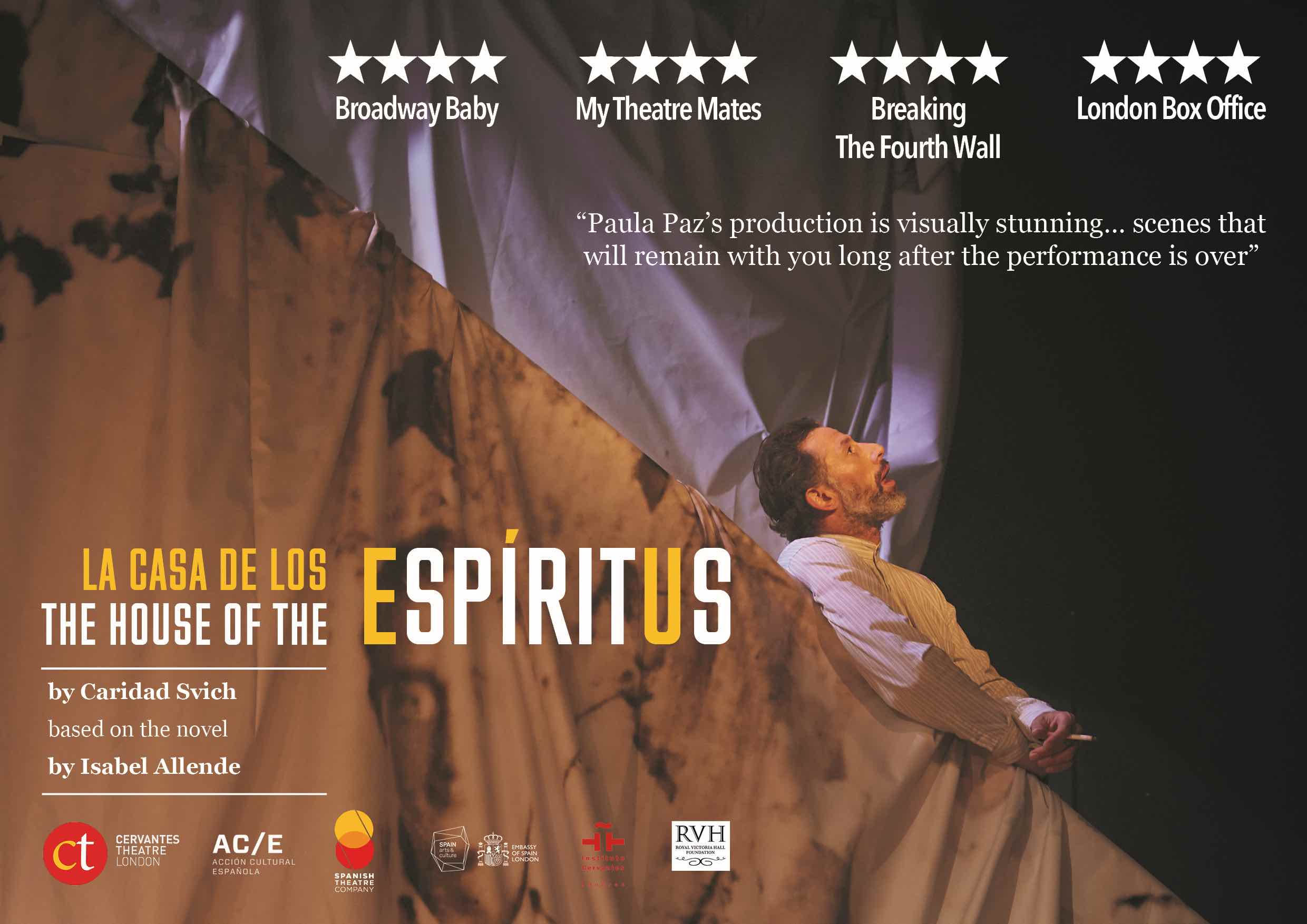
¿Cuáles fueron sus inicios del teatro? ¿Por qué eligió Londres?
Yo estudié teatro en Londres con 19 años. Estuve a punto de quedarme en la Royal Shakespeare Company, pero José Luis Gómez me llamó para su Edipo Rey y luego llegó Jaime Chávarri con sus Bicicletas son para el verano y regresé y me quedé en España. Mi maestro y amigo, Jorge Eines, me dijo que tenía una deuda pendiente con Londres y aquí estoy; aproveché que mandé a mi hija a estudiar aquí con 15 años y me vine para estar más cerca de ella. Junto con Paula Paz creamos la Spanish Theatre Company y empezamos a hacer Lecturas Dramatizadas en diferentes teatros. Más tarde el Council de Southwark nos puso en contacto con Network Rail por una nueva iniciativa que estaban planificando en Union Street y nos metimos en la locura de construir, sin dinero, el primer teatro de habla hispana en la historia del teatro británico y lo conseguimos, pero eso es una historia muy larga…
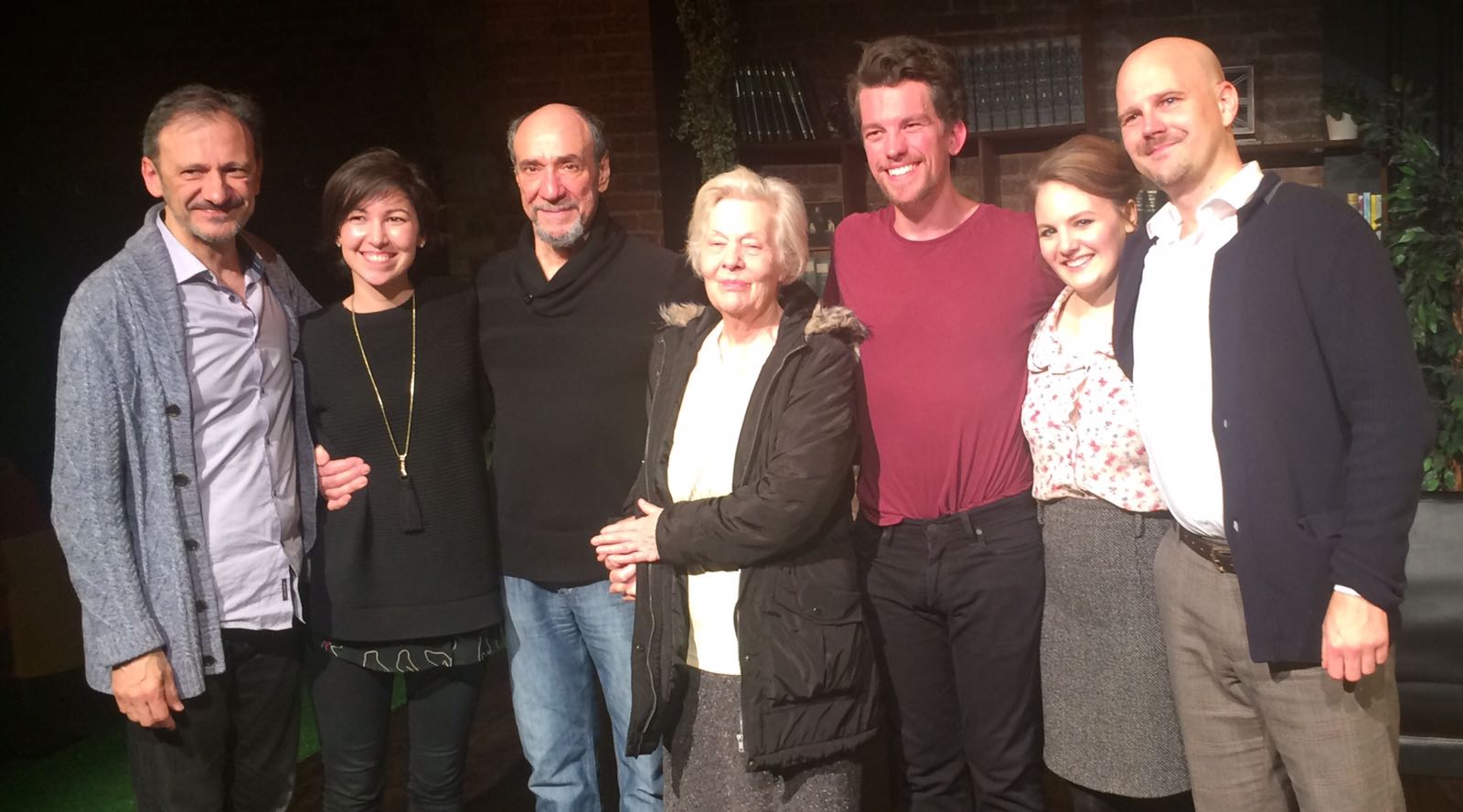
¿Qué momento hermoso recuerda de esta andadura?
La gente que nos ha ayudado, las caras de los espectadores cuando terminan las representaciones; colegios que vienen desde Bruselas a ver La casa de Bernarda Alba y se vuelven en el mismo día, o vuelan desde Belfast! Una mujer mayor, tras ver Yerma, llorando me dijo: «Llevo 27 años viviendo en Londres y poder vivir lo que he vivido hoy aquí con Lorca, en mi idioma, no tengo palabras, estoy realmente emocionada, por favor seguid así, ¡no desfallezcáis!”
Los alumnos con diferentes profesiones que quieren hacer teatro y que ves que les cambias la vida. Las personas que se han conocido y se han relacionado gracias a nuestras obras y nuestro teatro; la inmensa familia que se ha creado, es emocionante.
¿Cómo afecta el COVID-19 al Cervantes Theatre?
Hemos cerrado el teatro, cancelado la gira, nos hemos ido a casa y los planes que teníamos se han congelado, como es lógico, las posibles ayudas que creíamos que íbamos a tener este año desde España están en el aire junto al virus y el futuro es muy incierto. Sólo tenemos recursos para pagar dos meses el alquiler del teatro y puede que dejemos de existir. Vamos a hacer todo lo que esté en nuestras manos pero hay mucha incertidumbre.
De cualquier manera no dejo de pensar que hay mucha gente que va a perder sus trabajos, que no van a tener ni para comer, compañeros que van a sufrir un cambio radical en sus vidas, no somos los únicos y hemos de ser solidarios con todo lo que nos rodea, sólo con solidaridad se podrá salir de este golpe tan brutal e inesperado a las raíces mismas de nuestra sociedad.
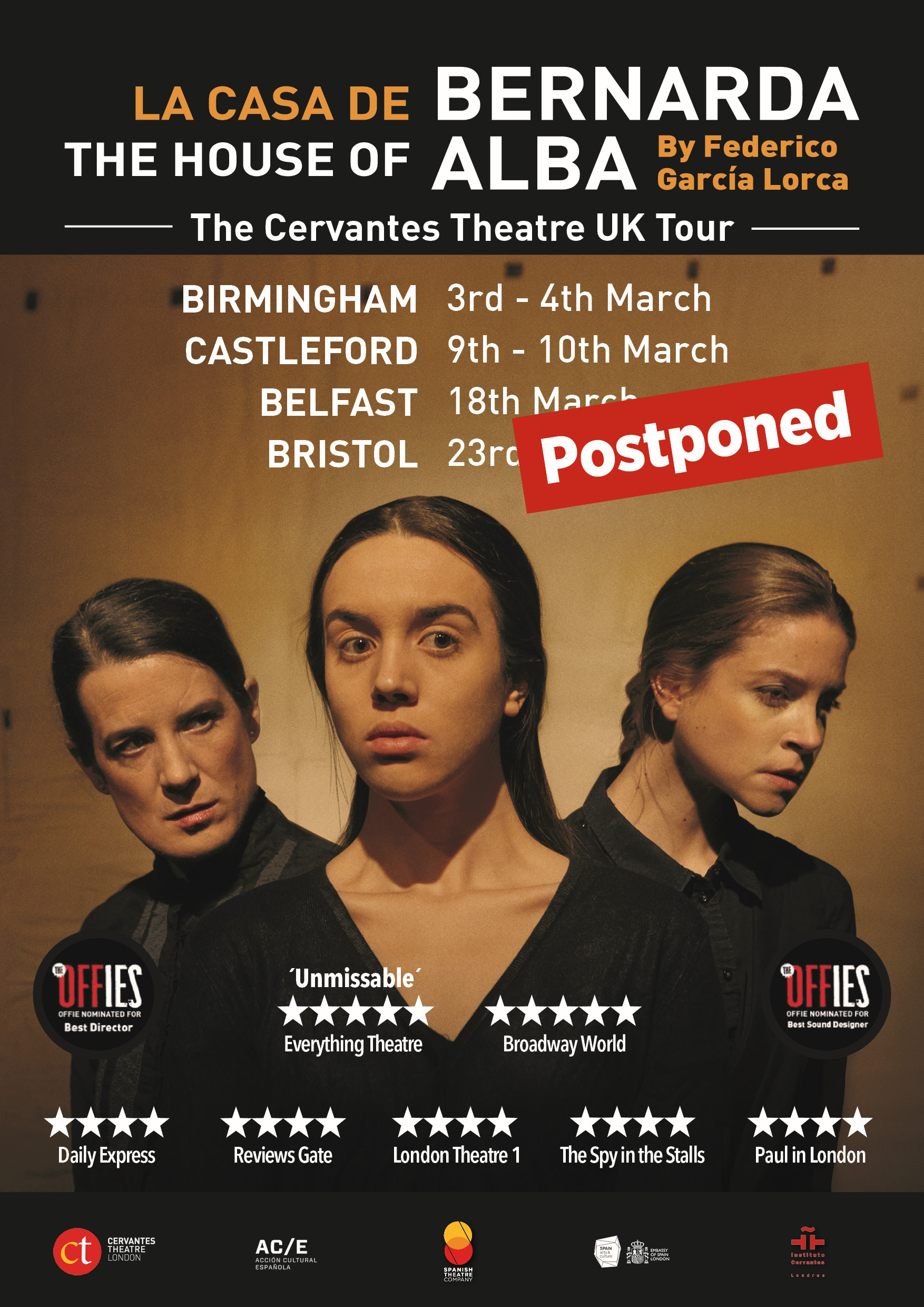
Además, han tenido que cancelar la gira de La Casa de Bernarda Alba. ¿Qué dió tiempo a hacer? ¿Con qué se queda de esa gira?
Pudimos hacer Birmingham y Leeds. Nos quedaba Belfast y Bristol y estábamos en conversaciones con otros lugares ante el éxito que estábamos teniendo.
Fue espectacular ver los teatros llenos de estudiantes, de la comunidad española y de británicos amantes de la cultura española, escuchando a Lorca y reaccionando ante esta obra de una manera que me sorprendió.
Me quedo con una frase que dijeron en Leeds: “¡Gracias por venir donde nunca viene nadie con obras como esta y tener la oportunidad de disfrutarla; por favor, volved!»
El Cervantes Theatre opera como una organización benéfica, ¿qué pueden hacer los amantes del teatro en estos momentos para ayudarles?
Ahora mismo estamos pidiendo toda la ayuda que sea posible para resistir hasta que podamos volver a abrir. Ya hay algunas personas que están reaccionando, hemos recibido alguna donación y también se han dado de alta en nuestra sistema de Amigos del Teatro. No tengo palabras para agradecerlo, me conmueve saber que somos importantes para algunas personas y es por ellas y por todo el mundo que valora lo que hacemos, que seguimos con fuerzas para seguir luchando contra el virus y contra las carencias. Cualquier persona que quiera contribuir lo puede hacer a través de nuestra web www.cervantestheatre.com.
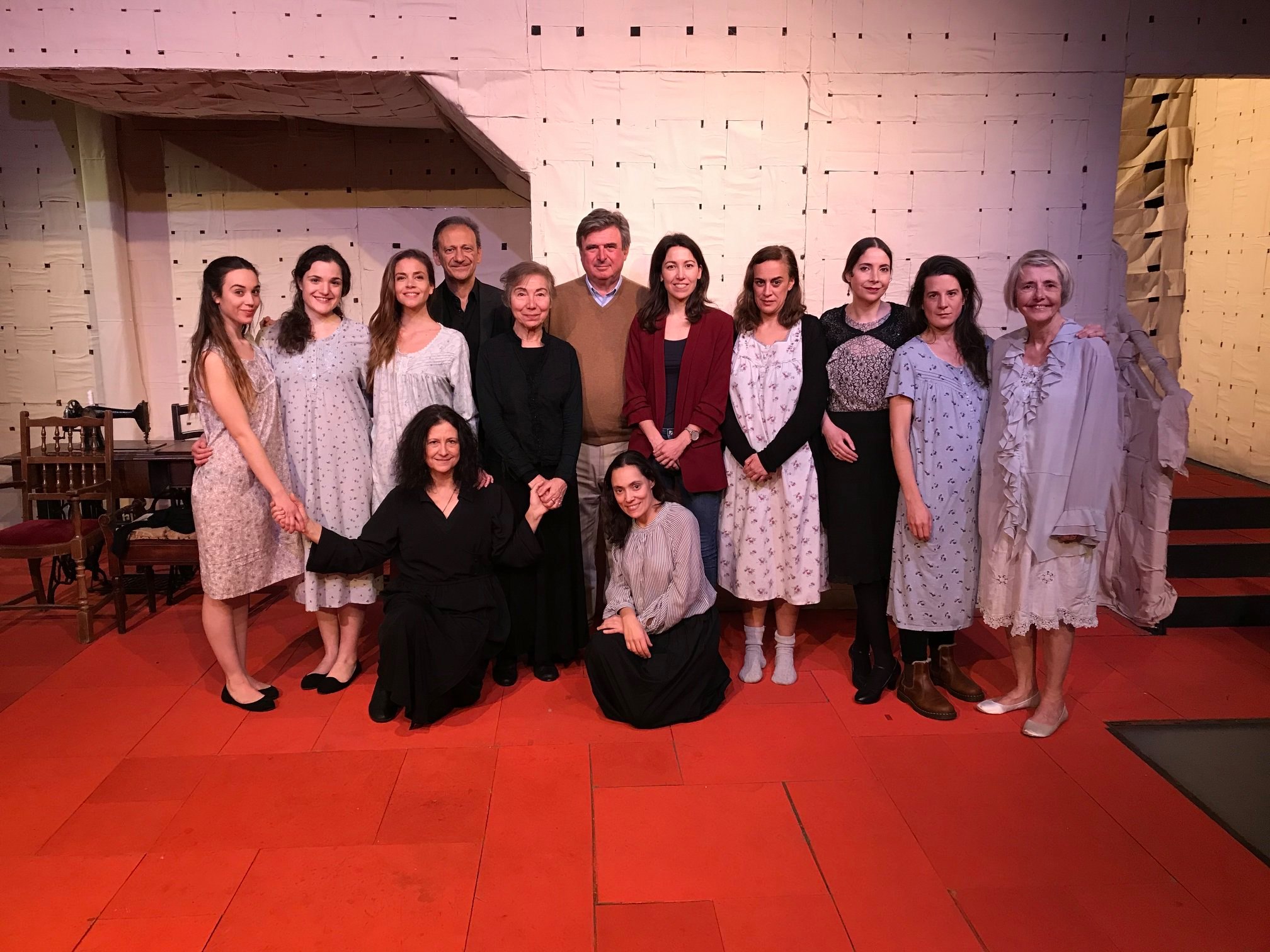
¿Qué programación esperan poder hacer el resto del año?
Teníamos planificado dedicar el año a las Spanish Golden Ages 1530-2020, hacer un recorrido por la creatividad española desde el Siglo de Oro hasta nuestros días. Era un programa que iba a durar dos años (en Noviembre del año que viene se cumplirían cinco años desde que abrimos el teatro) pero, como te puedes imaginar, ahora está en el aire. Íbamos a hacer teatro, poesía, música pero ahora, sinceramente, no sé…
¿Por qué considera que es tan importante la labor del Cervantes Theatre?
Creo que no debo ser yo quien responda a esta pregunta. Habíamos triplicado las cifras de audiencia en estos tres años y medio que llevábamos abiertos. Todo iba muy bien y la repercusión que estábamos teniendo, pese a los pocos recursos con los que contábamos, era espectacular.
Y habría que pensar en que cuando volvamos a la «normalidad», nuestro país se va a enfrentar a un reto económico y social sin precedentes, habrá que tomar medidas muy importantes internamente pero también externamente y nosotros humildemente podemos ayudar, con nuestro espacio, a comunicar esa «normalidad» en un país como el Reino Unido con tantos vínculos económicos y culturales con España y en una ciudad como Londres.
Cultura, Industria, Turismo y Exteriores deberían ser nuestros interlocutores cuando haya que poner en marcha de nuevo la maquinaria… Queremos ser parte de este nuevo renacimiento que ha de llegar y esperamos serlo.
HISPANIC-BRITISH CONVERSATIONS – Jorge de Juan: «Cervantes Theatre wants to be part of the rebirth that is to come and we hope to be»

This week we begin a series of interviews with personalities from the Spanish-British sphere. Our first guest, Jorge de Juan, is the founder and artistic director at Cervantes Theatre. He will tell us about the beginnings of the theatre, how the crisis of COVID-19 affects his work and also, his plans for the future.
Jorge de Juan (Cartagena, 1961) is a renowned Spanish producer, director, and actor. He trained at the Royal School of Dramatic Art in Madrid as well as the British Theatre Association. Directing credits include: The Public and The Grain Store (Fourth Monkey); End of the Rainbow; Dracula; The 39 Steps The Woman in Black (Spanish production); Blood Wedding, The Judge of the Divorces… and others, The House of Bernarda Alba and Yerma (STC).
As an actor, he has appeared in more than 20 plays, 30 films and many TV series. In 1990 he won the Francisco Rabal Film Award for his starring role in El Mejor de los Tiempos and the Turia Theatre Award for his performance in La Mujer de Negro, 1998. As a director, his film Bala Perdida, starring David Carradine, received both Best Film and Best Soundtrack at the Mostra de Valencia Cinema awards.
De Juan also founded and opened the Cervantes Theatre in November 2016. It is the proud accomplishment of the Spanish Theatre Company (STC), a charity which brings the best Spanish and Latin American theatre to London and British audiences in order to promote the Spanish language and dramatic arts. The theatre stages a combination of STC productions and performances of Spanish and Latin American plays from other theatre companies. The Instituto de Cervantes in London and Acción Cultural Española (AC / E) actively support the work of Cervantes Theatre in London.

What were your beginnings in theatre? And why did you choose London?
I studied Theatre Arts in London when I was 19 years old. I intended to work with the Royal Shakespeare Company, but José Luis Gómez auditioned me for his staging of Oedipus Rex and subsequently, Jaime Chávarri arrived with his Bicycles are for the summer and so, I came back and stayed in Spain. My good friend and teacher, Jorge Eines, told me that I had a pending debt with London and here I am; I took advantage of the fact that I sent my daughter to study here when she was 15 years old and came to be closer to her. Together with Paula Paz, we created the Spanish Theatre Company and began to do Dramatised Readings in different theatres. Later, the Southwark Council put us in touch with Network Rail about a new scheme that they were planning in Union Street. The scheme threw us into the madness of building the first Spanish-speaking theatre in the history of British theatre and we did it – with very few resources! – but that’s a very long story …

What is the most beautiful moment you remember from this journey?
The people who helped us, the faces of the audiences at the end of performances; the schools that came from Brussels on a single day return to see The House of Bernarda Alba, or even the ones who flew in from Belfast! Once, an old woman came to me in tears after seeing Yerma and told me: «I have been living in London for 27 years and to be able to live what I have lived here today with Lorca, in my language, I have no words, I am really excited, please keep it up, do not falter !”.
Students in all different professions who want to do theatre and you see that you change their lives in realtime. People who have met and related to our plays and our theatre: the huge family that we have created is beyond exciting.
How does the COVID-19 crisis affect the Cervantes Theatre?
We have closed the theatre, cancelled the tour; we have gone home and all the plans we had are frozen. Additionally, the potential Spanish aid expected for next year is now possibly delayed because of the virus and our future is very uncertain. We only have the resources to pay the theatre’s rent for two months and, after that, we may cease to exist altogether. We will do everything we can, but there is a lot of uncertainty.
Either way, I can’t stop thinking that there are many people who are going to lose their jobs. Everyone of us will undergo a radical change in our lives – we are not alone in this and we all have to join in solidarity. Only through solidarity can we withstand this brutal and unexpected blow to the very roots of our society.

In addition, you have had to cancel the tour of La Casa de Bernarda Alba. What were you able to achieve despite the cancellation? What did you learn from the tour?
We were able to do Birmingham and Leeds tours. We were meant to proceed to Belfast and Bristol and we were also in talks with other venues to continue the tour due to the success we were having.
It was spectacular to see the theatres full of students, the Spanish community and British lovers of Spanish culture, listening to Lorca and reacting to this play in a way that surprised me.
I am left with a phrase they said in Leeds: “Thank you for coming where no one ever comes with works like this and giving us the opportunity to enjoy it; please come back!”.
Cervantes Theatre operates as a charity, what can theatre lovers do right now to help you?
Right now we are asking for as much help as possible to resist the closure. There are already some people reacting and we have received donations. Others have also registered in our Friends Scheme (Membership Scheme). I have no words to thank them but I am moved to know of our importance to people and it is for them – and for everyone who values what we do – that we continue with the strength to fight against the virus and its impact on our industry . For anyone who would like to contribute, please head to our website: www.cervantestheatre.com.

What programme do you hope to complete this year?
We had planned to dedicate the year to the «Spanish Golden Ages 1530-2020», to take a tour of Spanish creativity from the Golden Age to the present day. It was a programme that would have lasted two years (next November would have been our five year anniversary) but, as you can imagine, it’s now all in the air. We were going to continue showing theatre, poetry, music but now, honestly, I don’t know …
Why do you consider the work done by Cervantes Theatre to be so important?
I don’t think I should be the one to answer this question. But in three and a half years since we first opened, we have tripled the size of our audience. Everything was going very well and the impact we were having, despite the few resources we had, was spectacular.
Nevertheless, even when we will return to «normality», our country will face an unprecedented economic and social challenge. We will have to take very important measures internally as well as externally. With our space, in our humble way, we will continue to communicate that «normality» in a country like the United Kingdom with so many economic and cultural ties to Spain.
Culture, Industry, Tourism and Foreign Affairs should be our interlocutors when the social machinery starts up again and we want to be part of this social rebirth. This is what we hope will come and what we hope to be.
The theatre of Ramírez-Pantanella arrives in London thanks to Instituto Cervantes and Cervantes Theatre
The playwright, stage director and one of the scriptwriters of «Money Heist» Almudena Ramírez-Pantanella, will talk about her creation and will read extracts from her latest work, «Golpe de gracia», in an event that will take place on Saturday, July 20 at 4:00 pm at Cervantes Theatre in London.
«Collaborating with the Instituto Cervantes and the Cervantes Theatre is a joy and a great opportunity to publicise my work abroad. I hope that opportunities for the representation of my works can emerge here in the United Kingdom,» she explains.
Throughout her work, Ramírez-Pantanella reflects on contemporary subjects including South Korean philosopher and essayist Byung-Chul Han, the French philosopher and sociologist Jean Baudrillard and Italian writer, poet and film director Pier Paolo Pasolini.
«For us, it is important to support Spanish theatre in one of the world capitals of the theatre,» explains Ignacio Peyró, director of the Instituto Cervantes in London. «With our support of the talk and reading of Almudena Ramírez-Pantanella, we seek to show and give visibility to the talent of Spanish playwrights, as we have done in other cycles with the Cervantes Theatre and also in the cinema, with the screening of the Female Space films in the same theatre this spring «.
For her part, the associate director of the Cervantes Theatre, Paula Paz, recognizes that it is a pleasure to be able to receive Almudena again and open the doors of her theatre so she can share her experience at the residence of the Royal Court. «The Cervantes Theatre was born, among other things, with the aim of making known new Spanish dramaturgy and to serve as an international platform in London for our playwrights. This year at the Cervantes Theatre, ‘They take the floor’ and this Saturday we will be able to hear and learn first-hand the latest work of Almudena Rodríguez-Pantanella,» Paz adds.
At first, Ramírez-Pantanella explains that what interested her was the figure of the «influencer» and making a work in which, using her figures as protagonists, she could reach a young audience. For now, the theatre is where Ramírez-Pantanella feels more comfortable and where she finds more artistic freedom, since it offers her more possibilities to explore language, dialogues and images.
Ramírez-Pantanella has worked as a screenwriter in the celebrated series «Money Heist», an experience that she considers «important» in her career: «This is a series that has had worldwide success and being part of the team is a pride».
Residence at the Royal Court Theater
The playwright, who participates in a residency at the Royal Court Theater in London, gets the best out of this experience. «I have been immersed for three weeks in the English theatre, reading and watching theatre. I’m leaving with an infinite list of English authors, but also European ones, that I want to read», she emphasizes. Through meetings with different authors, directors, literary departments, development and production, the Spanish author has been able to discover some initiatives that are being carried out in the United Kingdom to support the theatre and specifically the dramatists, which she hails as, «very interesting to support public theatre.»
The playwright recognizes that she has had the good fortune to meet theatre writers she admires as Martin Crimp, and has also discovered «the inspiring personality» of the author Caryl Philipps. In addition, during the residency, she has worked with Sarah Maitland in the translation of the play ‘Golpe de Gracia’, which has given her many keys to rewriting the text, also along with Anthony Simpson Pike and Ellie Horne, who have helped her in the process of rewriting.
This summer, Ramírez-Pantanella will participate in a congress in Mérida on «Dialogues with the Greco-Latin Classics and the New Dramaturgies». In fact, she does not hide her desire that in the future he could write something for the Merida festival. In addition, in August she will finish the writing of a monologue that for now is entitled «Attacking the sun». And she is also in the pre-production phase of her first film, together with the production company Canacosmi Producciones. The film is already written, it is titled «The great machine» and they intend to start shooting it next summer.
